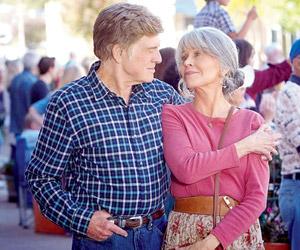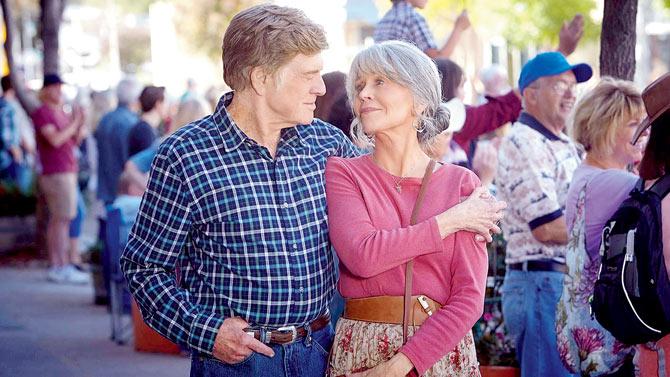Director Ritesh Batra quietly wraps up his brilliant 'loneliness' trilogy, with half the hype that Mumbai filmmakers usually generate


Robert Redford and Jane Fonda in Our Souls At Night
 I'm possibly the last of desi viewers who looks at an international film — good, better, best — and, like a lazy Versova producer, wonders how amazing it would be if that subject was adapted in an Indian scenario.
I'm possibly the last of desi viewers who looks at an international film — good, better, best — and, like a lazy Versova producer, wonders how amazing it would be if that subject was adapted in an Indian scenario.
ADVERTISEMENT
And yet, that moment in Ritesh Batra's Our Souls At Night (dropped on Netflix few days ago), where Robert Redford, 81, and Jane Fonda, 79 — platonic bed-mates for a while — finally step out on a date, conscious of how their Colorado small-town folk might react to the old, widow-widower couple behaving like teenagers in love, I couldn't help visualising this moment fitting in so easily into a desi mohalla/kasba.
Looking at Fonda's striking red dress, I can imagine a local wit, gazing at the two from a chai tapri go, "Boodhi ghodi, lal lagaam!" That's really how we tend to look down upon geriatric desires in general — a fact that the film Lipstick Under My Burkha captured beautifully with the phenomenal Ratna Pathak Shah's character.
When the lead couple of Our Souls are in public, Redford's character admits, "This doesn't seem too revolutionary so far." His girlfriend (for all intents and purposes) wonders if that's a good thing. Of course it is. Only that the person having an issue with them being together is really the woman's son. He thinks the guy she's with is bad company — a fine inversion for how parents become when their kids start dating!
Fonda plays a lonely lady who, right in the film's first scene, shows up at her neighbour's door, asking him point-black, if he'd like to sleep with her. "It's not about the sex. It's not about getting through the night, you know," she suggests. You can understand where she's coming from. She sincerely craves company/cuddle. Don't we all, on occasion?
Well, I've never been married to copiously expound on the merits of the institution. But it's seemingly easy to sense that the point of emotional and physical monogamy —even if forced, sometimes — would be companionship, chiefly at old age, when work isn't so much a distraction, and social life gets restricted to friends, of which there aren't too many left anyway. This is besides procreation, of course (married couple providing the next generation a warm nest). For all the plans of living together, you never know who leaves first.
What Our Souls At Night excels foremost is in unraveling the softness and melancholy of old age, and its relationship with solitude, and memories. It shouldn't surprise us that the director behind this fine adaptation of Kent Haruf's novel of the same name is Ritesh Batra, who began his career with The Lunchbox (2013), which was similarly an affectionate, gentle meditation on loneliness.
The Lunchbox remains India's most commercially successful film in the art-house circuit. It was loved equally by local audiences, given that this debut film got long legs, thanks to popular desi directors Karan Johar and Anurag Kashyap championing it all the way to the box-office. Given how mainstream press functions, everyone spoke about Kashyap and Johar's involvement with the movie — or the fact that it did not get selected as India's Oscars entry. Everyone casually forgot about the Bandra boy, Sydenham grad Batra, who had actually written and directed the film, inspired by his love for Mumbai's dabbawallas — a subject that he initially wished to film a documentary on.
Batra showed up earlier this year with the filmic version of the novella, The Sense Of An Ending, Julian Barnes' Booker-winning literary-fiction — a genre that is hard to film, if not 'unfilamable' altogether. That one, again, delicately dealt with ageing and hind-sight, making Our Souls pretty much a culmination of Batra's fine trilogy on loneliness — unless he chooses to stick to the intriguing subject still (there's much to explore).
Either way, let alone a pattern, you can spot the filmmaker's indelible stamp, almost like an auteur, in the three films he's directed thus far, making him also, without doubt, India's first proper filmmaking export since Shekhar Kapur.
It helps that Batra is also blessed enough to work with Redford and Fonda, who're not just the handsomest octogenarians on screen, but they also bring to the film a sense of recognition and nostalgia — especially for fans of the classic Barefoot In The Park (1967). In fact, as Fonda fondly recalls in an interview, the hotel they check into in the film to see how far they can go with each other, was in fact the same hotel where they'd first made love in Barefoot!
Our Souls is also the film that Redford had wrapped up before announcing his retirement from a glorious acting career — perhaps a special one for journalists in particular, since no one's yet done a better film on newspapering than All The President's Men (1976). We'll miss you, Mr Redford. And yeah, you shouldn't miss his final film.
Mayank Shekhar attempts to make sense of mass culture. He tweets @mayankw14 Send your feedback to mailbag@mid-day.com
 Subscribe today by clicking the link and stay updated with the latest news!" Click here!
Subscribe today by clicking the link and stay updated with the latest news!" Click here!







